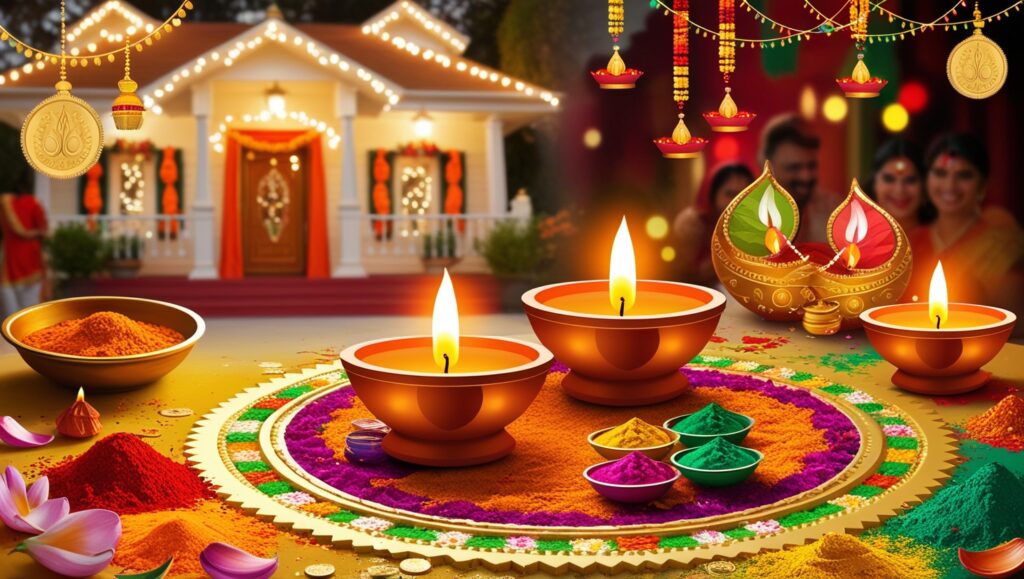Diwali, also known as Deepavali, is one of the most significant and widely celebrated festivals in India and among Indian communities around the world. Known as the “Festival of Lights,” Diwali symbolizes the victory of light over darkness, good over evil, and knowledge over ignorance. The festival usually lasts for five days and falls between October and November, marking the end of the harvest season and the onset of winter. As families come together to celebrate, one of the most notable customs during Diwali is the purchase of gold. This blog explores the significance of Diwali, the cultural importance of gold during this festive season, and its relevance to Vedic astrology.
The Historical and Cultural Significance of Diwali
Diwali is celebrated for various reasons across different regions of India. Here are some key narratives associated with the festival:
- Return of Lord Rama: In Hindu mythology, Diwali commemorates the return of Lord Rama, his wife Sita, and brother Lakshmana to their kingdom Ayodhya after defeating the demon king Ravana. The people of Ayodhya celebrated their return by illuminating the city with oil lamps (diyas) and bursting fireworks.
- Lord Krishna’s Victory: In some traditions, Diwali marks the day Lord Krishna defeated the demon Narakasura, symbolizing the triumph of good over evil.
- Goddess Lakshmi’s Blessings: Diwali is also associated with Goddess Lakshmi, the deity of wealth and prosperity. On this day, devotees perform puja (worship) to invite her blessings into their homes.
- Jain and Sikh Traditions: For Jains, Diwali signifies the attainment of nirvana by Lord Mahavira, while Sikhs celebrate Bandi Chhor Divas, marking the release of Guru Hargobind Ji from imprisonment.
The Purchase of Gold: A Symbol of Wealth and Prosperity
Gold has a significant role in Diwali celebrations for several reasons:
- Auspiciousness: Gold is considered a symbol of wealth and prosperity in Indian culture. Buying gold during Diwali is believed to attract good fortune and blessings from Goddess Lakshmi.
- Investment: Many families purchase gold jewelry or coins during Diwali as an investment, considering it a safe and valuable asset. It is common for people to view gold not just as jewelry but as a form of savings for future needs, such as weddings or emergencies.
- Tradition and Rituals: Buying gold during Diwali is often integrated into the rituals of the festival. Families may perform a special puja for the newly purchased gold, invoking blessings for prosperity.
- Cultural Significance: In many Indian families, gifting gold is a traditional practice during weddings and festivals, making it a vital aspect of family bonding and cultural heritage.
The Relationship Between Gold and Vedic Astrology
Vedic astrology, an ancient Indian system of astrology, offers insights into the relationship between celestial bodies and human life. The significance of gold during Diwali can also be examined through the lens of Vedic astrology:
- Planetary Associations: In Vedic astrology, gold is associated with the Sun, which symbolizes authority, power, and health. The Sun is often considered the king of planets, representing wealth and success. Purchasing gold during Diwali can be seen as an effort to harness the Sun’s positive energies for prosperity.
- Rahu and Ketu: In astrological terms, Rahu and Ketu, the shadow planets, have a strong influence on wealth. Their positions in a person’s natal chart can affect financial well-being. Diwali, being a time of new beginnings, offers an opportunity for individuals to realign their financial destiny through auspicious purchases, including gold.
- Jupiter’s Blessings: Jupiter, the planet of abundance and prosperity, also plays a role in wealth accumulation. Astrologically, Diwali is a time when Jupiter’s favorable position can enhance one’s financial fortunes, making it an auspicious time to invest in gold.
- Nakshatras and Muhurat: Many believers consult astrologers to determine the most auspicious time (muhurat) for making significant purchases like gold during Diwali. Specific nakshatras (lunar mansions) are believed to be particularly favorable for acquiring wealth, guiding individuals to time their purchases wisely.
Conclusion
Diwali is a festival rich in cultural and spiritual significance, symbolizing the triumph of light and goodness. The tradition of purchasing gold during this festival reflects deep-rooted beliefs in prosperity, wealth, and auspiciousness. As families come together to celebrate and invite blessings into their homes, the interplay of Vedic astrology further enhances the relevance of this age-old custom. Whether for investment or as a symbol of familial bonds, the purchase of gold during Diwali remains a cherished tradition that resonates with many across the globe.
As you celebrate Diwali this year, consider the deeper meanings behind the rituals and the astrological influences that shape your financial destiny. May your Diwali be filled with light, love, and abundant blessings!

